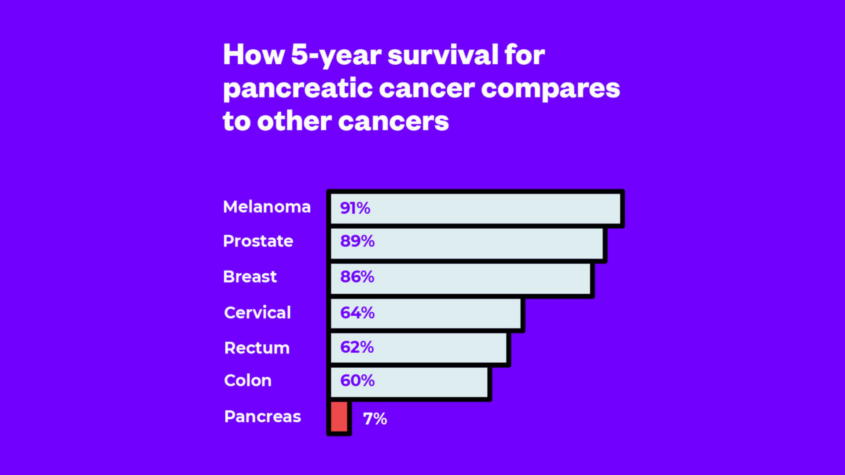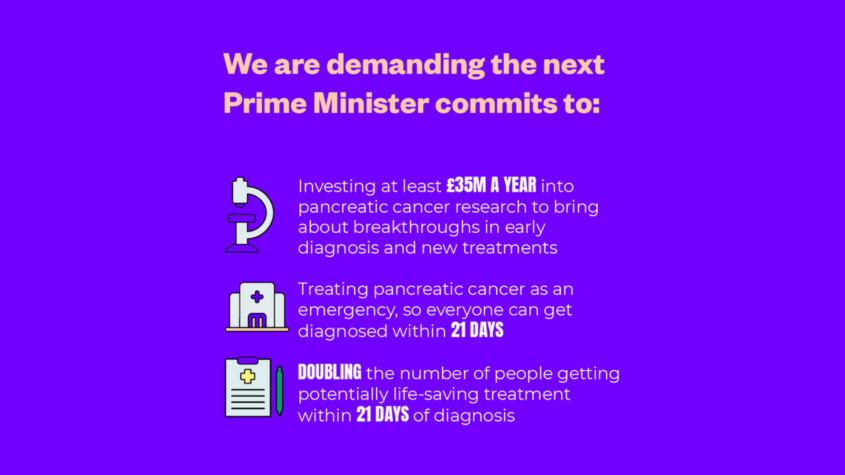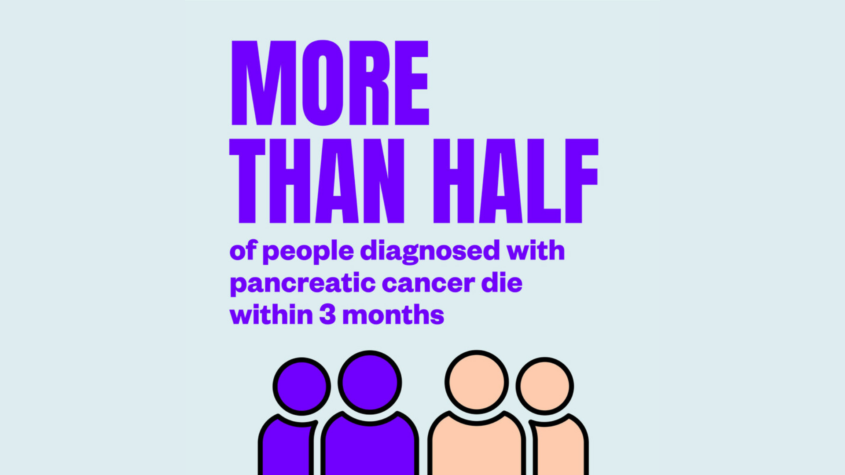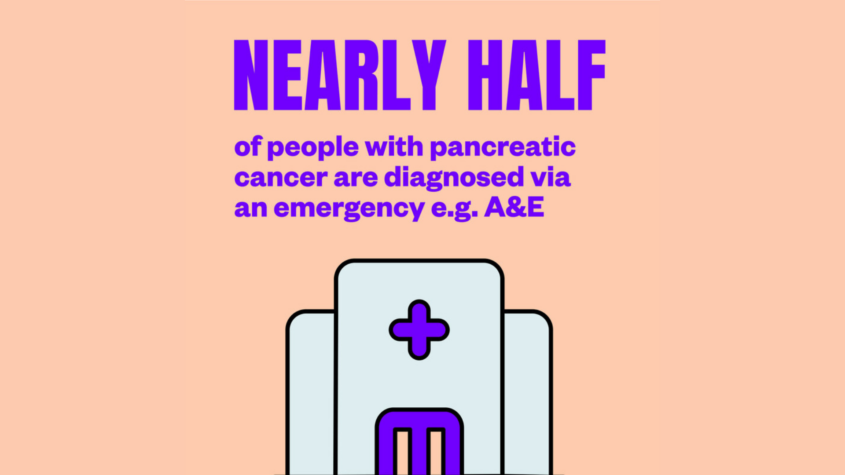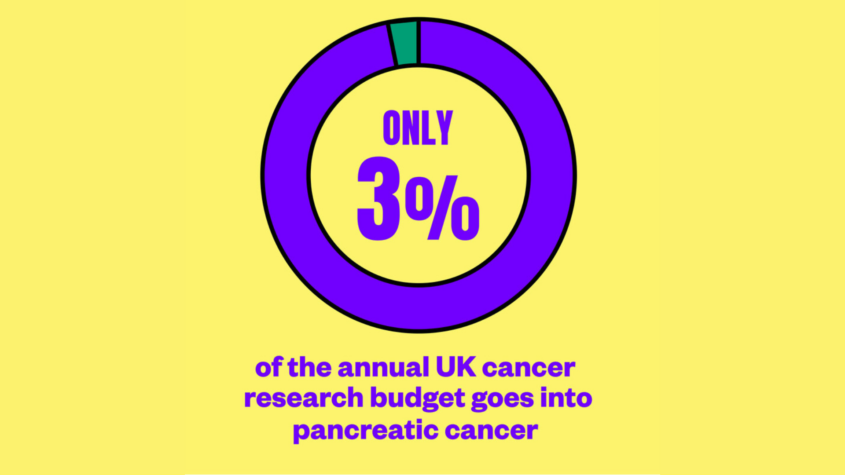MP welcome pack
Thank you for taking the time to read through our MP information pack.
We’re grateful to you for taking time to find out more about the stark and shocking situation that faces people affected by pancreatic cancer across the UK today.
Background
For over fifty years, UK governments from all parties have left pancreatic cancer behind. In 2024, over half of people diagnosed with pancreatic cancer are still dying within three months.
The UK is falling behind the rest of the world. We are 29th out of 33 countries for five year survival. Despite this, it receives only 3% of the UK’s cancer research funding. This is unacceptable.
Without urgent action, by the end of the next Parliament, pancreatic cancer will overtake breast cancer as the fourth biggest cancer killer.
This spring, 63,505 of Pancreatic Cancer UK’s supporters wrote to the leaders of the five biggest UK-wide parties to ask them to support our Demand Survival Now calls. We are calling on the next government to:
- Invest at least £35m a year into pancreatic cancer research to bring about breakthroughs in early diagnosis and new treatments
- Treat pancreatic cancer as an emergency, so everyone gets diagnosed within 21 days
- Double the number of people getting life-saving treatment within 21 days of diagnosis
You can read our Demand Survival Now manifesto in full here.
What can you do?
- Meet with the team from Pancreatic Cancer UK, who can tell you more about the situation in your local area and how you can help to improve outcomes for people affected by pancreatic cancer in this Parliament. They can also introduce you to your constituents who have been affected by this disease.
- Join the All Party-Parliamentary Group on Less Survivable Cancers, to hear from experts on these left-behind cancers, and have the opportunity to question them about what needs to change.
- Ask parliamentary questions about pancreatic cancer. You don’t need to make your maiden speech before you are able to ask questions, so this is one of the fastest ways you can deliver for your constituents affected by this devasting disease.
Statistics
- Half of people diagnosed with pancreatic cancer die within three months
- 7 in 10 people diagnosed with pancreatic cancer will receive no treatment
- There have been zero treatments specifically designed for pancreatic cancer – existing treatments have been borrowed from other cancer types.
- Without urgent action, 50,000 more people will die from pancreatic cancer over the course of the next parliament.
| Cancer Alliance | One Year Survival Rate (%) |
| Cheshire and Merseyside | 32 |
| East Midlands | 23.6 |
| East of England – North | 26.4 |
| East of England – South | 27.9 |
| Greater Manchester | 27.3 |
| Humber Coast and Vale | 26.9 |
| Kent and Medway | 24.9 |
| Lancashire and South Cumbria | 23.3 |
| North Central London | 33.5 |
| North East London | 29.1 |
| Northern Ireland | 23.4 |
| North West and South West London | 32.1 |
| Northern | 27.1 |
| Peninsula (Devon, Cornwall and the Isles of Scilly) | 26 |
| Scotland | 27.1 |
| Somerset Wiltshire Avon and Gloucestershire | 26.5 |
| South East London | 35.2 |
| South Yorkshire and Bassetlaw | 27 |
| Surrey and Sussex | 29.8 |
| Thames Valley | 27.5 |
| Wales | 26 |
| Wessex | 29.5 |
| West Midlands | 26.2 |
| West Yorkshire and Harrogate | 27.3 |
Support Services
When you have pancreatic cancer, hope is hard.
So we’re making sure people can have expert support to hold onto. Through our Support Line, specialist nurses are only a phone call or email away. They can talk about symptoms, treatment, or the difficult emotions that come with the disease. Whether someone has a long list of questions or don’t know where to start, we’re here to help.
We also provide tailored emails and an informative website. We make sure everyone has the expert information they need.
You can find out more about our support services here.
Research projects
Pancreatic Cancer UK work with dedicated researchers to think smarter and push the boundaries of what’s possible. From cutting-edge detection tests to cancer-killing therapies and improved monitoring of those most at risk, our research strives for earlier detection and better treatment. To date we have funded over £14m of research across the UK, and are driving more breakthroughs in pancreatic cancer, which has been historically underfunded.
You can find out more about some of our research projects and see what projects we fund in your area using our Research Project Finder.
Symptoms awareness
Many of the symptoms of pancreatic cancer are vague and non-specific, meaning that these are often not a major cause for concern and are not picked up by GPs as being indicative of the deadliest common cancer. Late diagnosis is a major part of why pancreatic cancer is so deadly, and many people have multiple visits to their GP before receiving a diagnosis.


We have a wide range of symptoms awareness materials available to let people know about the warning signs of pancreatic cancer, which can be ordered or downloaded here. You are free to display these in your office or local area to raise awareness of pancreatic cancer symptoms.
Latest news



12 February 2025
Emmerdale star to run TCS London Marathon in wife’s memory
Emmerdale star Tony Audenshaw is bringing his running shoes out of retirement to take on the 2025 TCS London Marathon to raise money for our charity i...



4 February 2025
Our response to the new National Cancer Plan consultation
Secretary of State for Health and Social Care, Wes Streeting has announced the launch of the consultation for the new Cancer Plan.
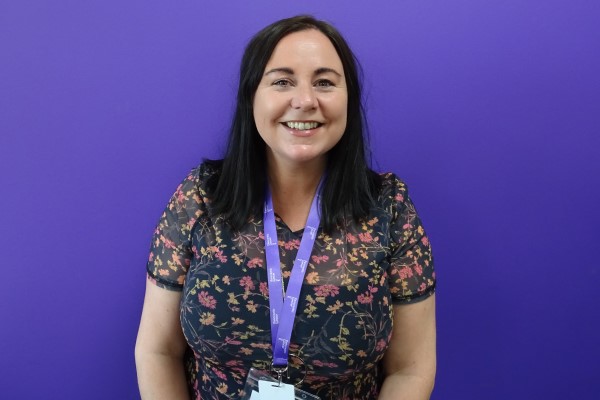


15 January 2025
Support with the rising cost of living
Find out how to get the support you need to deal with the rising cost of living, from benefits and grants to tips for eating well on a budget.


